
Recommend these apps for patients interested in incorporating mindfulness into their care plan.
Fam Pract Manag. 2018;25(3):21-24
Author disclosure: no relevant financial affiliations disclosed.
Mindfulness interventions have demonstrated numerous benefits for patients with many medical conditions. A recent systematic review and meta-analysis cites strong evidence to support mindfulness in the treatment of depression, chronic pain, tobacco use disorder, and other addiction disorders.1,2 During pregnancy, mindfulness has been shown to improve anxiety, depression, and perceived stress.3 Mindfulness has also been shown to improve obesity-related eating behaviors and help overweight and obese individuals lose weight.4
Mobile apps enable patients to practice mindfulness anywhere. They also can help beginners to learn meditation and other mindfulness practices without investing significantly in time or transportation. To help you guide patients to the best apps, this article focuses on five that earned top ratings when reviewed using FPM's “SPPACES” criteria.
APP REVIEW CRITERIA
S — Source or developer of app
P — Platforms available
P — Pertinence to primary care practice
A — Authoritativeness/accuracy/currency of information
C — Cost
E — Ease of use
S — Sponsor(s)
STOP, BREATHE & THINK
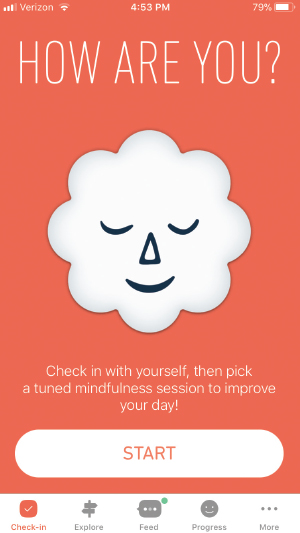
Stop, Breathe & Think chooses the best meditation for the user based on his or her current, self-reported mood.
Source: Stop, Breathe & Think, PBC.
Platforms available: Android (http://bit.ly/1sL9ksA); iOS 10.1 or later for iPhone, iPad, and iPod touch (https://apple.co/L3Hp39).
Pertinence to primary care practice: The app explains how to begin meditating, the benefits of mindfulness, and even some of the pathophysiology behind meditation and mindfulness. Thirty free guided meditations help with stress, anxiety, depression, focus, compassion, and sleep. The app also includes free videos on yoga and acupressure for stress. Users can set customized timers for meditations and breathing and choose soundscapes or chimes to play during these exercises. To encourage continued use, the app tracks daily streaks of activity, total time meditated, and users' reported moods pre- and post-meditation.
Authoritativeness/accuracy/currency of information: Stop, Breathe & Think was developed by a nonprofit organization that teaches meditation concepts to children, but it is unclear who developed the app's content. Numerous television shows, magazines, and websites have featured the app, and it won the 2017 Webby People's Voice Award for Best Health App. It was last updated in April 2018 (Android and iOS).
Cost: The basic meditation content is free. Subscriptions of $9.99 per month or $59.99 per month unlock more than 60 additional meditations, eight yoga and acupressure videos, and six additional soundscapes and chimes for the meditation timer.
Ease of use: Upon opening the app, the user is asked to quickly rate his or her mood and is then directed to the most beneficial meditations.
Sponsor: Tools for Peace.
Rating:

Stop, Breathe & Think is a great app for patients who are beginners and want to give meditation a try.
HAPPIFY
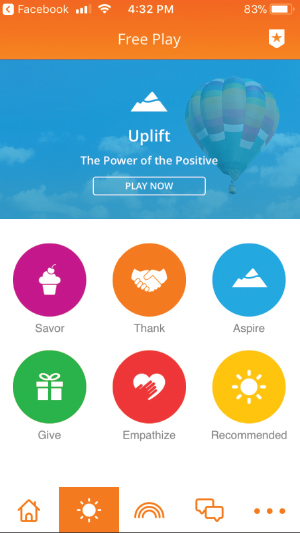
Happify improves mindfulness through daily games, tasks, and meditations.
Source: Happify Inc.
Platforms available: Android 4.4 or later (http://bit.ly/2cFCGEw); iOS 8.0 or later for iPhone, iPad, and iPod touch (https://apple.co/1qjMaVa).
Pertinence to primary care practice: The app includes 13 free meditation tracks discussing how to be a mindful leader, better cope with stress, calm anxiety, conquer negative thoughts, defeat loneliness, and improve relationships and friendships. The app includes games to boost mood, a news feed with uplifting stories, webinars, and an online social community.
The “six tasks” framework is a unique feature of this app that assigns tasks to six categories: savor, thank, aspire, give, empathize, and recommended. Users can upload related photos and learn about the benefit of each task they perform. The app includes numerous infographics about happiness, mindfulness, and meditation.
Authoritativeness/accuracy/currency of information: Happify has input from psychologists (both PhDs and PsyDs), individuals with master's degrees in applied positive psychology, an integrative medicine physician, and psychiatrists. Numerous newspapers, magazines, and television shows have featured it. The app was last updated in April 2018 (Android and iOS).
Cost: Free. Happify Plus, with additional mindfulness tracks and other content, is available for $11.99 per month or $59.99 per year.
Ease of use: The app seamlessly transitions between pages. The games are fun and engaging. The infographics are grouped by category but unfortunately are not searchable. The content is available in English, Chinese, French, German, Japanese, Portuguese, and Spanish.
Sponsors: TTCP, Marketplace Funds Venture Capital, Bridge Builders Collaborative, Mangrove Capital Partners, Thylacine Capital, b-to-v Partners AG, Founder Collective, Eric Aroesty, Craig Kallman, Brian Bedol, David Kleinhandler, and Daniel Gutenberg.
Rating:

Happify is an ideal app for improving mindfulness and happiness.
10% HAPPIER
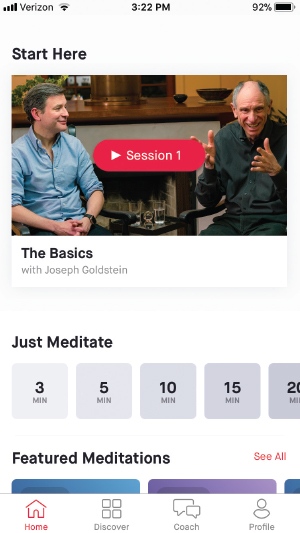
10% Happier guides meditation and explains how and why it is beneficial.
Source: 10% Happier Inc.
Platforms available: Android 4.4 or later (https://bit.ly/2AIxqdd); iOS 10.0 or later for iPhone, iPad, and iPod touch (https://apple.co/2pC1fIJ).
Pertinence to primary care practice: An introductory seven-session course helps the user understand how to meditate and provides videos explaining why and how meditation works to improve health and happiness. Meditations can be chosen based on content or duration, which ranges from three to 20 minutes. The app includes a meditation coach, advice for applying mindfulness to one's everyday life, and meditations for falling asleep, building concentration, focusing on gratitude, walking, coping with pain, mindful eating, and managing anxiety and stress.
Authoritativeness/accuracy/currency of information: 10% Happier is based on a book by Dan Harris, who took up meditation after experiencing an on-air panic attack while reporting for ABC News. Harris includes input from international meditation teachers and researchers, including a psychiatrist. It was last updated in April 2018 (iOS) and March 2018 (Android).
Cost: The app's seven-session introductory course and mindfulness meditations are free. Access to additional meditation courses and videos, including offline sessions, requires a premium subscription of $14.99 per month or $99.99 per year.
Ease of use: Videos are downloaded quickly. The app is very easy to use and understand.
Sponsor: 10% Happier Inc.
Rating:

10% Happier is an essential app for patients who want an introduction to meditation and don't mind paying for additional content.
INSIGHT TIMER
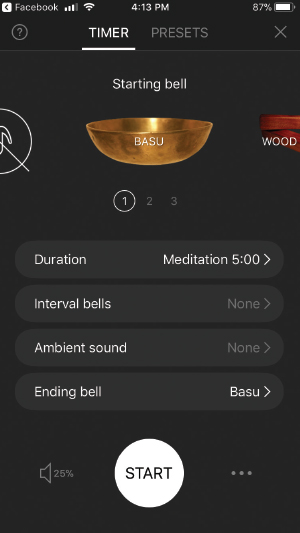
Insight Timer has the largest number of free meditations of any app available.
Source: Insight Network Inc.
Platforms available: Android (https://bit.ly/1gBQi21); iOS 10.0 or later for iPhone, iPad, and iPod touch (https://apple.co/1lzvVpl).
Pertinence to primary care practice: The app includes more than 8,000 meditations, 1,000 music tracks, 5,000 discussion groups, and information on 500 topics. Users can pick a meditation based on topic or duration. Users can see their prior downloads and follow their favorite teachers and topics.
Authoritativeness/accuracy/currency of information: Insight Timer was developed by a group of meditators, and users can connect with more than 1,800 meditation teachers in 25 languages. The app itself is available in English and French. The app was last updated in April 2018 (Android and iOS).
Cost: The majority of content is free. A premium subscription of $2.99 per month allows users to listen offline, repeat tracks, fast forward and rewind, and pick up where they left off.
Ease of use: Because of the multitude of topics and teachers, it can be overwhelming to choose a meditation. Downloading takes only one or two seconds.
Sponsor: Insight Network Inc.
Rating:

Insight Timer is a great app for patients who want access to thousands of free meditations.
HEADSPACE
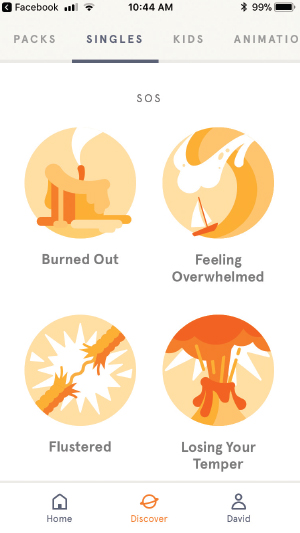
Headspace is a well-known and well-studied mindfulness app.
Source: Headspace Inc.
Platforms available: Android 4.0.3 or later (https://bit.ly/1lDWZnd); iOS 9.0 or later for iPhone, iPad, and iPod touch (https://apple.co/1u2rB1p).
Pertinence to primary care practice: Headspace has short “SOS” meditations for panic, anxiety, or stress; “mental reset” meditations of two to three minutes; and longer guided meditation “packs” that address happiness, work and performance, sports, and student life. There are also meditation packs for children. Users can add friends, watch animated meditation tips, and set push notifications to remind them to meditate. In addition, iOS users can track time spent on mindfulness within the Apple Health app.
Authoritativeness/accuracy/currency of information: Meditations are led by Andy Puddicombe, a renowned mindfulness expert, author, and former Buddhist monk who has been featured in magazines, newspapers, and television shows. Headspace has been the subject of numerous studies, which have suggested its use can decrease depressive symptoms, enhance mood, improve outcomes, and boost employee resilience and work engagement.5–7 Multiple companies use Headspace for employee improvement, including Google, Aetna, Delta, General Electric, and Unilever. The app was last updated in April 2018 (Android and iOS).
Cost: The basic version, which includes 10 guided meditation sessions, is free. The majority of content requires a subscription, which costs $12.99 per month or $94.99 per year. A “forever” subscription costs $399.99.
Ease of use: The user interface is intuitive, and loading times are very quick. The current meditation topic is listed on the top of the first screen, but finding additional meditation packs can require some scrolling or searching.
Sponsor: Headspace Inc.
Rating:

Headspace is a great evidence-based mindfulness app for patients willing to pay for its content.
WANT MORE APP REVIEWS?
Visit the FPM SPPACES collection.
Recent app reviews have addressed the following topics:
Coping with anxiety and depression,
Adopting healthy habits,
Determining whether to prescribe aspirin therapy,
Treating symptoms in menopausal women,
Ensuring patients adhere to their medication for acne,
Providing tobacco users motivation and reinforcement to quit.
